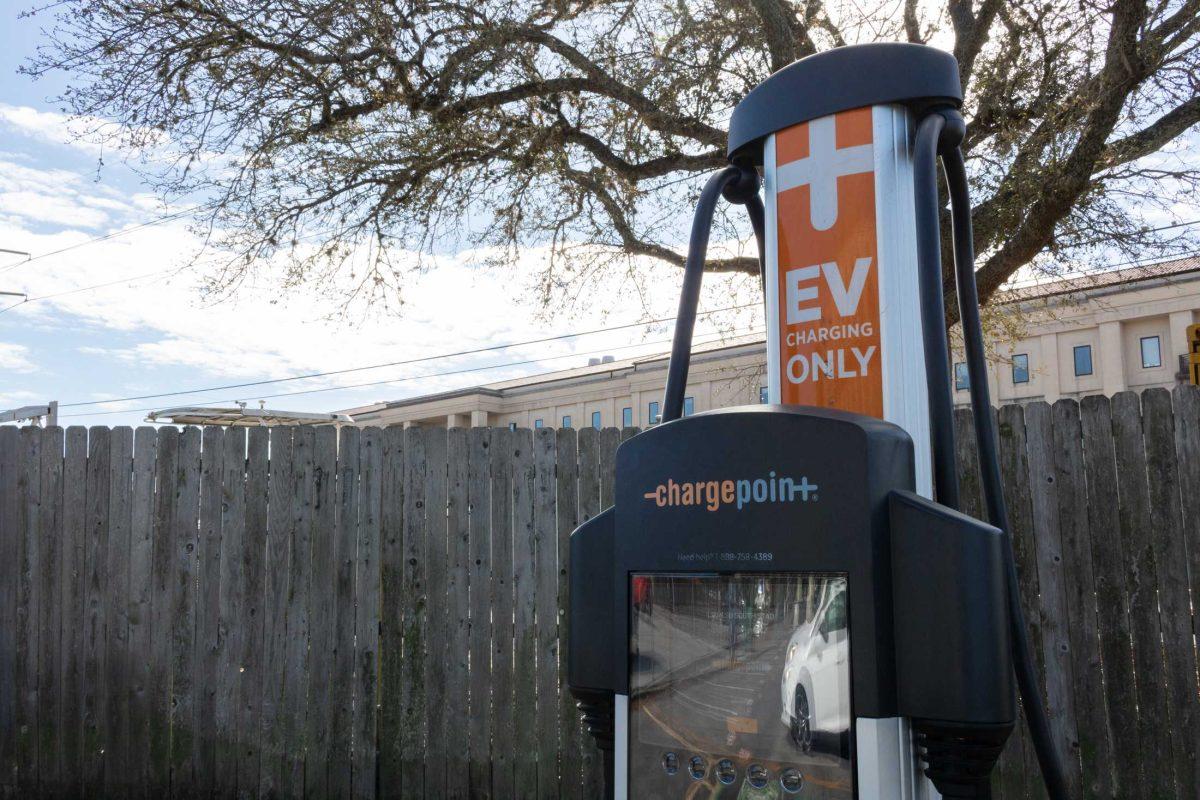LSU will be adding nine new electric charging stations to campus, according to Tammy Millican, the executive director of facility services. The additions come as the electric vehicle market is projected to skyrocket in coming years.
“As we’re beginning to see the number of electric vehicle drivers increase, we are increasing the number of charging stations to meet that demand,” Millican said.
Six stations will be placed near the Howe-Russel parking lot by the Art and Design Building. Three stations, funded through a grant from the Louisiana Department of Environmental Quality, don’t have a decided location yet.
Millican said there are currently 35 drivers signed on to Chargepoint, the company that runs the charging stations. She said students use the Chargepoint app to access the stations. That number of users has been steadily increasing over the last six months, she said.
Millican said there are currently four charging stations on campus. Each station has two ports, so there are eight ports available. The additional nine stations will add 18 ports.
Millican said that in 2011, when LSU installed the first charging station, there were no electric vehicle drivers on campus. Millican believes the number of electric vehicle owners will keep increasing.
Geography graduate student Alicia Cerquone, a senator for the graduate school in Student Government, authored a resolution that passed last semester calling for the electric charging stations without decided locations to be made accessible to students with disabilities, which the current stations aren’t.
“None of the chargers that exist currently on LSU’s campus are in places that are accessible to students with disabilities or faculty and staff with disabilities for that matter. People with disabilities cannot access these spaces,” Cerquone said.
According to the U.S. Access Board, for an electric vehicle charging station to be disability accessible, the charging space must be at least 11 feet wide and 20 feet long and must have an adjoining access aisle that’s 5 feet wide.
Millican said three of the new charging stations will be accessible to students with disabilities.
Cerquone said she’s run into some issues charging her vehicle on campus, saying that one of the lots was so busy that she could almost never charge her car there. She said last semester, one of the handles on a charging station broke. Depending on the type of electric vehicle students drive, they weren’t able to use that station, she said.
Millican said they’ve had electrical issues with some of the chargers in the past but that those issues have been resolved. Cerquone said the new chargers are supposed to be more effective and efficient.
Biochemistry junior Rami Abdalla said he’s ran into issues in the past with chargers being damaged or not running as well as they should. He said that only two of the chargers are easily accessible to students.
Abdalla said there’s also high traffic through these stations, so it’s hard to find a charger. He said he’s had difficulty getting the charger to pair with his phone, which is required to access the charger.
“There’s been a couple times where I’ve had very pleasant experiences,” Abdalla said. “It’s a very mixed amount, but I will say my experiences have been more negative than positive.”
Over the next five years, Louisiana will receive approximately $73 million for electric vehicle infrastructure through the Biden administration’s Infrastructure Investment and Jobs Act, according to the Louisiana Department of Transportation and Development. The department plans to administer the development of more charging stations across the state.
The electric vehicle market size is expected to cross $980 billion by 2028, according to Facts and Factors, a market research company.
Cerquone provided a list of the number of electric vehicle charging stations at other Southeastern Conference schools:
Texas A&M: 30
University of Tennessee: 22
Vanderbilt University: 19
Auburn: 17
Bama: 11
University of Florida: 11
University of Georgia: 6
LSU: 4
University of Mississippi: 3
Arkansas: 2
Mississippi State: 0
University of Kentucky: 0
University of Missouri: 0
University of South Carolina: 0





